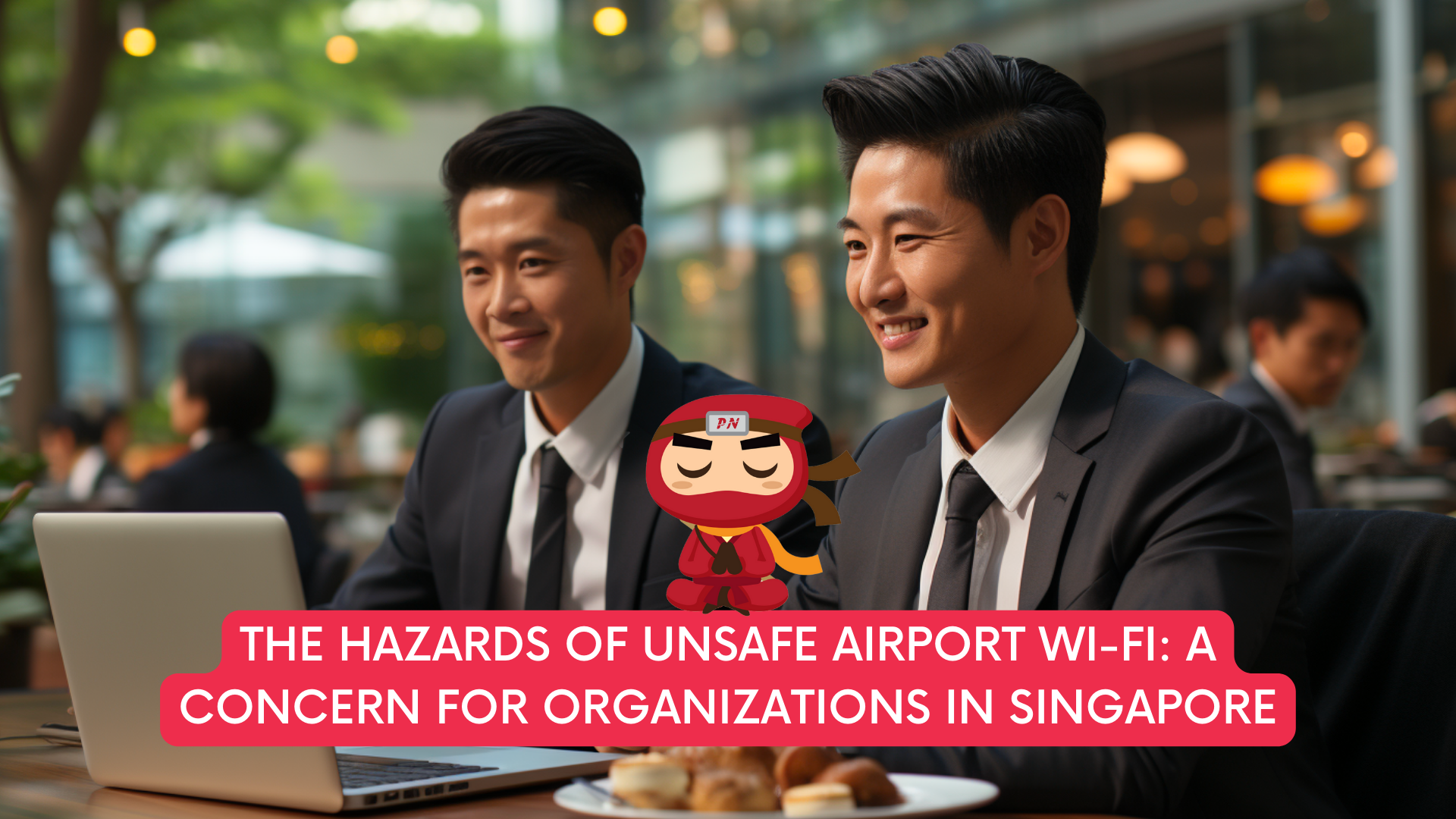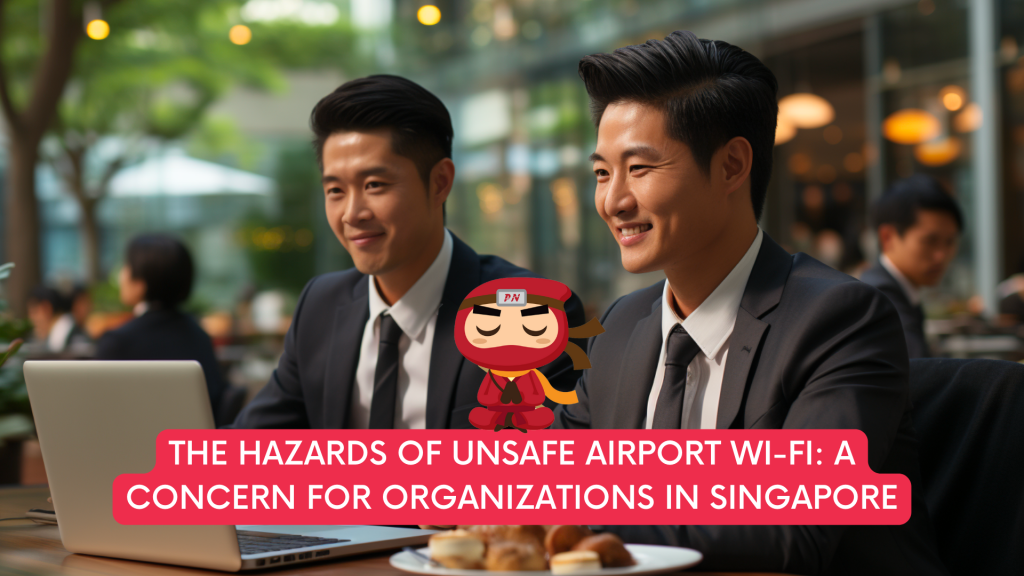KEEP IN TOUCH
Subscribe to our mailing list to get free tips on Data Protection and Cybersecurity updates weekly!







Air travel has become an essential part of business operations, enabling organizations in Singapore to establish global connections and expand their reach. As professionals frequently traverse airports, the convenience of free public Wi-Fi offered at these terminals is often embraced.
However, this convenience comes with significant cybersecurity risks that can pose severe threats to organizations. In this article, we explore the dangers of unsafe airport Wi-Fi and the measures that organizations in Singapore should undertake to protect sensitive data and ensure the security of their operations.
Airports around the world, including those in Singapore, have recognized the need for travelers to stay connected while awaiting their flights. As a result, they provide free public Wi-Fi access, enabling travelers to check emails, conduct business, and browse the internet conveniently. However, the very convenience that these networks offer often lulls users into a false sense of security.
1. Man-in-the-Middle Attacks: Cybercriminals can exploit the lack of encryption on open Wi-Fi networks to intercept and manipulate data transmissions between devices and the internet. This can result in the theft of sensitive information, such as login credentials and financial data.
2. Malware Distribution: Hackers can inject malware into unsecured networks, targeting unsuspecting users. Once infected, malware can compromise devices, steal data, or provide unauthorized access to an organization’s internal systems.
3. Phishing Attacks: Cybercriminals often set up fake Wi-Fi networks with names similar to legitimate ones. When users unknowingly connect to these networks, attackers can launch phishing attacks to steal login information and compromise accounts.
4. Data Interception: Unsecured Wi-Fi networks can expose sensitive business data to eavesdropping. Corporate emails, confidential documents, and proprietary information become vulnerable to interception by malicious actors.

For organizations based in Singapore, executives and employees who frequently travel via airports are particularly vulnerable to these threats. The data they carry—ranging from customer information to strategic plans—could become the target of cyberattacks. Additionally, as more professionals continue to work remotely, they may unwittingly connect to these networks to access company resources, putting both personal and corporate data at risk.
1. Use a Virtual Private Network (VPN): A VPN encrypts data transmissions, shielding them from potential interceptors. Organizations should encourage their employees to connect to a trusted VPN before accessing the internet over public Wi-Fi.
2. Disable Auto-Connect: Turn off the auto-connect feature on devices to prevent them from connecting to unsecured Wi-Fi networks without user consent.
3. Use Cellular Data: Whenever possible, opt to use your mobile data plan instead of public Wi-Fi networks, as cellular connections are generally more secure.
4. Enable Two-Factor Authentication (2FA): Ensure that all accounts, including business and personal, have 2FA enabled. This adds an extra layer of security by requiring a second form of verification.
5. Update and Secure Devices: Keep all devices up to date with the latest security patches and software updates. Enable device encryption and install security apps to protect against malware.
6. Educate Employees: Organizations should educate their employees about the risks of unsafe Wi-Fi networks and provide guidelines for secure internet usage while traveling.
7. Create a Travel Cybersecurity Policy: Develop a clear policy that outlines cybersecurity best practices for traveling employees. This policy should address the use of public Wi-Fi, the necessity of VPNs, and steps to take in case of a security breach.
While the allure of free public Wi-Fi at airports is undeniable, organizations in Singapore must recognize the cybersecurity risks that come with it. The potential for data breaches, malware infections, and other cyber threats underscores the importance of adopting stringent security measures. By prioritizing the use of VPNs, disabling auto-connect features, and following best practices for secure online behavior, organizations can protect sensitive data and ensure the safety of their operations even while navigating the digital landscapes of busy airport terminals. It’s not just about staying connected; it’s about staying secure.

Your appointed DPO can work with you on your PDPA compliance, ensuring that there will be policies in place to make sure that the handling of personal data is PDPA compliant.
A Data Protection Officer (DPO) oversees data protection responsibilities and ensures that organisations comply with the Personal Data Protection Act (PDPA). Furthermore, every Organization’s DPO should be able to curb any instances of PDPA noncompliance as it is the officer responsible for maintaining the positive posture of an organisation’s cybersecurity.
DPOs complement organisations’ efforts to ensure that the organisation’s methods of collecting personal data comply with the PDPA. It also ensures that policies are set in place to make sure that there will be no instances of data breaches in the future.
Don’t wait any longer to ensure your organisation is PDPA compliant. Take our free 3-minute PDPA Compliance Self-audit checklist now, the same “secret weapon” used by our clients to keep them on track. Upon completion, we will send you the results so you can take the necessary action to protect your customers’ data. Complete the free assessment checklist today and take the first step towards protecting your customers’ personal data.